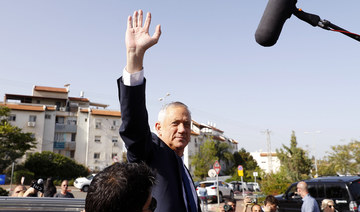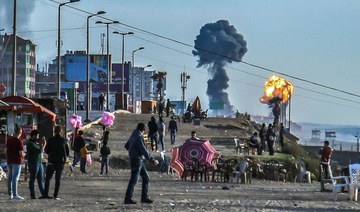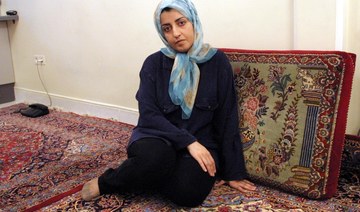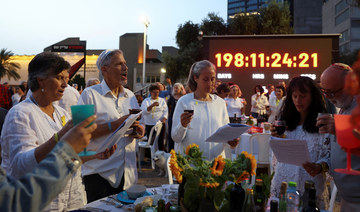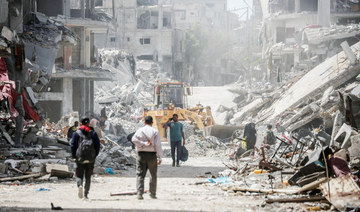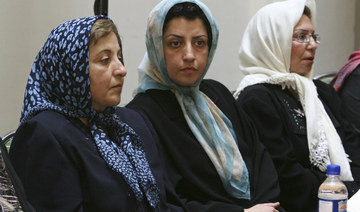JERUSALEM: When Palestinian preschooler Aisha a-Lulu came out of brain surgery in a strange Jerusalem hospital room, she called out for her mother and father. She repeated the cry over and over, but her parents never came.
Instead of a family member, Israeli authorities had approved a stranger to escort Aisha from the blockaded Gaza Strip to the east Jerusalem hospital. As her condition deteriorated, the child was returned to Gaza unconscious. One week later, she was dead.
A photo of Aisha smiling softly in her hospital bed, brown curls swaddled in bandages, drew an outpouring on social media. The wrenching details of her last days have shined a light on Israel’s vastly complex and stringent system for issuing Gaza exit permits.
It is a bureaucracy that has Israeli and Palestinian authorities blaming each other for its shortfalls, while inflicting a heavy toll on Gaza’s sick children and their parents.
“The most difficult thing is to leave your child in the unknown,” said Waseem a-Lulu, Aisha’s father. “Jerusalem is just an hour away, but it feels as though it is another planet.”
So far this year, roughly half of applications for patient companion permits were rejected or left unanswered by Israel, according to the World Health Organization. That has forced over 600 patients, including some dozen children under 18, to make the trek out of the territory alone or without close family by their side.
The system stems from Hamas’ takeover of Gaza in 2007, when it ousted the Western-backed Palestinian Authority. Israel and Egypt responded by imposing a blockade that tightly restricted movement in and out of Gaza.
The blockade, which Israel says is necessary to prevent Hamas from arming, has precipitated a financial and humanitarian crisis in the enclave. For years, Gaza’s 2 million residents have endured rising poverty and unemployment, undrinkable groundwater and frequent electricity outages. Public hospitals wrestle with chronic shortages of drugs and basic medical equipment.
In what it portrays as a humanitarian gesture to help Gaza’s civilians, Israel permits Palestinian patients to seek medical treatment at hospitals in Israel and the West Bank once they pass a series of bureaucratic hurdles. COGAT, the Israeli defense body that issues the permits, says it insists that all patients cross with an escort, usually a close relative, unless they wish to go alone or require immediate treatment that doesn’t allow time for security screening.
In order to get a permit, patients must first submit a diagnosis to the West Bank-based Palestinian Health Ministry, proving that their treatment is not available in Gaza. Then a Palestinian liaison requests exit permits from COGAT, which reviews the applications and passes them to Israel’s Shin Bet security agency for background checks.
According to WHO, the approval rate has plummeted in recent years.
It said that in 2012, Israel allowed in 93% of patients and 83% of their companions for treatment. For the month of April 2019, the figure stands at just 65% of patients and 52% of their companions.
A COGAT official disputed the figures, saying they don’t take into account that the number of permit applications has grown as Gaza’s health care system deteriorates, and that Israel has started issuing permits less regularly but for prolonged stays. The official, speaking on condition of anonymity under agency rules, said COGAT has tried to ease restrictions by designating a permit specifically for parents of child patients.
The agency said it issued 4,000 permits for patient escorts in the first quarter of 2019, including 1,398 for parents of sick children.
After being diagnosed with brain cancer, Aisha received immediate approval to get out of Gaza for what was hoped to be life-saving surgery. But when her parents approached the Palestinian Civil Affairs Commission for escort permits, their process ground to a halt.
To their bewilderment, Palestinian officials told them not to apply, saying it was too risky.
At 37, Waseem is below the age that Israel deems acceptable for swift entry on security grounds. Today, all men under 55 require extra screening, which means waiting, usually for months, according to Mor Efrat, the Gaza and West Bank director for Physicians for Human Rights Israel. As for Aisha’s mother, Muna, a quirk of her upbringing in Egypt left her without an official Israeli-issued ID card required to receive a permit.
“We tell families to find a companion that won’t give Israel any reason to refuse,” said Osama Najar, spokesman for the Palestinian Health Ministry. “We want to save the child and, yes, that can mean sending them alone.”
In this sense, the Palestinian Authority “acts as a subcontractor for Israel,” said Efrat, forcing parents to make a difficult choice: delay their child’s urgent care, or search for someone else that Israel would be more likely to let cross.
Aisha’s parents said they scoured for alternatives, applying for an aunt and her 75-year-old grandmother, but Israel rejected both.
The girl’s only remaining hope, the Palestinian office told them, was to apply for as many older women as possible from their extended social network. A permit for Halima Al-Ades, a remote family acquaintance whom Aisha had never met, was approved.
Muna said she had no choice but to sign COGAT’s consent form and whisk her daughter out of Gaza for immediate treatment. She said the frustration of the sprawling bureaucracy, and the painful memory of her 5-year-old daughter crying for her on the phone during her last days, haunts her.
“It was the hardest time of my life,” she said. “My heart was being ripped out every day and every hour.”
The Shin Bet declined to comment on the case. But in a statement, it emphasized Israel’s security concerns about Gaza patients and their companions. “The terrorist organizations in the Gaza Strip, headed by Hamas, are working tirelessly to cynically exploit the humanitarian and medical assistance provided by Israel,” it said.
This means that Palestinians are often turned down without explanation or for reasons out of their control. “I feel confident telling you that most of these rejections are arbitrary,” said Efrat, of Physicians for Human Rights Israel.
Israel denies any official change in policy.
Alon Eviatar, a former high-ranking official with COGAT, said the goal remains the same. “On the ground, this means to make daily life as difficult as possible for Hamas, without crossing the red line to humanitarian disaster,” he said.
Eviatar acknowledged that the Israeli permit system was ineffective, inefficient and overburdened. “We are desperate for an alternative, to get Gaza to take care of itself and stop relying on Israel,” he said.
Aisha’s doctor in Jerusalem, Ahmad Khandaqji, said he has treated countless lone patients from Gaza over the past year, but that Aisha’s story stuck with him. “She felt abandoned and betrayed,” he said. “We saw how that directly impacted her recovery.”
Sick Gaza child caught in Israeli permit system dies alone
Sick Gaza child caught in Israeli permit system dies alone

- The death of the Palestinian girl has drawn attention to Israel's vastly complex system for issuing travel permits to Gaza medical patients and their families
- Instead of a family member, Israeli authorities had approved a stranger to escort Aisha from the blockaded Gaza Strip to the east Jerusalem hospital
Tent compound rises in Khan Younis as Israel prepares for Rafah offensive
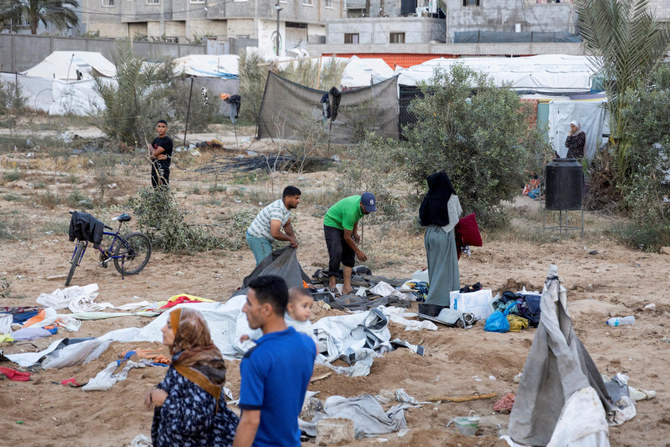
- Israel has said it plans to evacuate civilians from Rafah during an anticipated offensive on the southern city
- The Israel-Hamas war has killed more than 34,000 Palestinians
The tent construction is near Khan Younis, which has been targeted by repeated Israeli military operations over recent weeks. Israel has said it plans to evacuate civilians from Rafah during an anticipated offensive on the southern city, where hundreds of thousands of people have taken refuge during the war, now in its seventh month.
Also Monday, a failed rocket strike was launched at a base housing US-led coalition forces at Rumalyn, Syria, marking the first time since Feb. 4 that Iranian-backed militias have attacked a US facility in Iraq or Syria, a US defense official said. No personnel were injured in the attack, and no group has claimed responsibility for the attack.
The conflict has sparked regional unrest pitting Israel and the US against Iran and allied militant groups across the Middle East. Israel and Iran traded fire directly this month, raising fears of all-out war.
The war was sparked by the unprecedented Oct. 7 raid into southern Israel in which Hamas and other militants killed around 1,200 people, mostly civilians, and abducted around 250 hostages. Israel says militants are still holding around 100 hostages and the remains of more than 30 others.
The Israel-Hamas war has killed more than 34,000 Palestinians, according to local health officials, at least two-thirds of them children and women. It has devastated Gaza’s two largest cities and left a swath of destruction. Around 80 percent of the territory’s population have fled to other parts of the besieged coastal enclave.
The US House of Representatives approved a $26 billion aid package on Saturday that includes around $9 billion in humanitarian assistance for Gaza, which experts say is on the brink of famine, as well as billions for Israel. The US Senate could pass the package as soon as Tuesday, and President Joe Biden has promised to sign it immediately.
Iran’s foreign minister calls EU sanctions ‘regrettable’
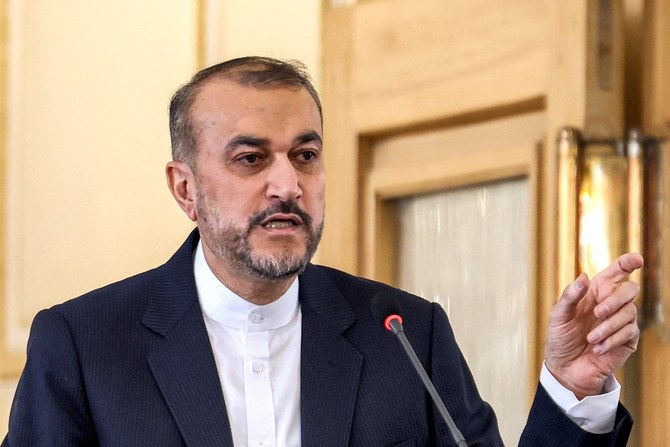
- EU foreign ministers agreed in principle to expand sanctions on Iran by agreeing to extend restrictive measures on Tehran’s weapons exports
DUBAI: European Union sanctions announced following Iran’s attack against Israel are “regrettable” because the country was acting in self-defense, Iran’s Foreign Minister Hossein Amirabdollahian posted on X on Tuesday.
Iran launched more than 300 drones and missiles on Israel in what it said was retaliation against a suspected Israeli bombing of its embassy compound in Damascus.
On Monday, EU foreign ministers agreed in principle to expand sanctions on Iran by agreeing to extend restrictive measures on Tehran’s weapons exports of any drone or missile to Iranian proxies and Russia.
“It is regrettable to see the EU deciding quickly to apply more unlawful restrictions against Iran just because Iran exercised its right to self-defense in the face of Israel’s reckless aggression,” Amirabdollahian said on X, before calling on the EU to apply sanctions on Israel instead.
More work will need to follow in Brussels to approve a legal framework before the expansion of the sanctions can take effect.
Israel’s Gaza war has negatively impacted human rights, says US report

- Rights issues include credible reports of unlawful killings, enforced disappearances and torture, says report
- Israeli military's conduct has come under scrutiny as its forces have killed over 34,000 in Gaza since Oct. 7
WASHINGTON: The war between Israel and Hamas that has killed tens of thousands of Palestinians in Gaza and resulted in a severe humanitarian crisis has had “a significant negative impact” on the human rights situation in the country, the US State Department said in its annual report on Monday.
Significant human rights issues include credible reports of arbitrary or unlawful killings, enforced disappearance, torture and unjustified arrests of journalists among others, said the State Department’s 2023 Country Reports on Human Rights Practices.
The report added that the Israeli government has taken some credible steps to identify and punish the officials who may have been involved in those abuses.
Israel’s military conduct has come under increasing scrutiny as its forces have killed 34,000 Palestinians in Gaza, according to the enclave’s health authorities, many of them civilians and children. The Israeli-occupied Gaza Strip has been reduced to a wasteland, and extreme food shortages have prompted fears of famine.
Israel launched its assault in response to a Hamas attack on Oct. 7, in which Israel says 1,200 people were killed.
Rights groups have flagged numerous incidents of civilian harm during the Israeli army’s offensive in Gaza, as well as raised alarm about rising violence in the Israeli-occupied West Bank, where Palestinian Health Ministry records show Israeli forces or settlers have killed at least 460 Palestinians since Oct. 7. But so far the Biden administration has said it has not found Israel in breach of international law.
Washington gives $3.8 billion in annual military assistance to its longtime ally. Leftist Democrats and Arab American groups have criticized the Biden administration’s steadfast support for Israel, which they say provides it with a sense of impunity.
But this month, President Joe Biden for the first time threatened to condition support for Israel, and insisted that it take concrete steps to protect humanitarian aid workers and civilians.
Israel’s Gaza war has negatively impacted human rights, says US report
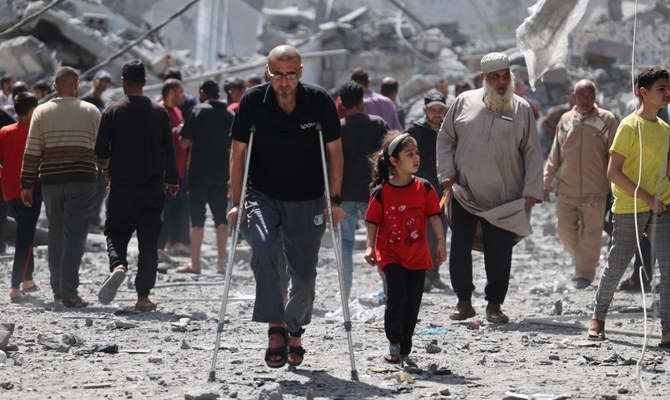
- The Israeli-occupied Gaza Strip has been reduced to a wasteland, and extreme food shortages have prompted fears of famine
WASHINGTON: The war between Israel and Hamas that has killed tens of thousands of Palestinians in Gaza and resulted in a severe humanitarian crisis has had “a significant negative impact” on the human rights situation in the country, the US State Department said in its annual report on Monday.
Significant human rights issues include credible reports of arbitrary or unlawful killings, enforced disappearance, torture and unjustified arrests of journalists among others, said the State Department’s 2023 Country Reports on Human Rights Practices.
The report added that the Israeli government has taken some credible steps to identify and punish the officials who may have been involved in those abuses.
Israel’s military conduct has come under increasing scrutiny as its forces have killed 34,000 Palestinians in Gaza, according to the enclave’s health authorities, many of them civilians and children. The Israeli-occupied Gaza Strip has been reduced to a wasteland, and extreme food shortages have prompted fears of famine.
Israel launched its assault in response to a Hamas attack on Oct. 7, in which Israel says 1,200 people were killed.
Rights groups have flagged numerous incidents of civilian harm during the Israeli army’s offensive in Gaza, as well as raised alarm about rising violence in the Israeli-occupied West Bank, where Palestinian Health Ministry records show Israeli forces or settlers have killed at least 460 Palestinians since Oct. 7. But so far the Biden administration has said it has not found Israel in breach of international law.
Washington gives $3.8 billion in annual military assistance to its longtime ally. Leftist Democrats and Arab American groups have criticized the Biden administration’s steadfast support for Israel, which they say provides it with a sense of impunity.
But this month, President Joe Biden for the first time threatened to condition support for Israel, and insisted that it take concrete steps to protect humanitarian aid workers and civilians.
Nobel laureate urges protest against Iran’s ‘war on women’
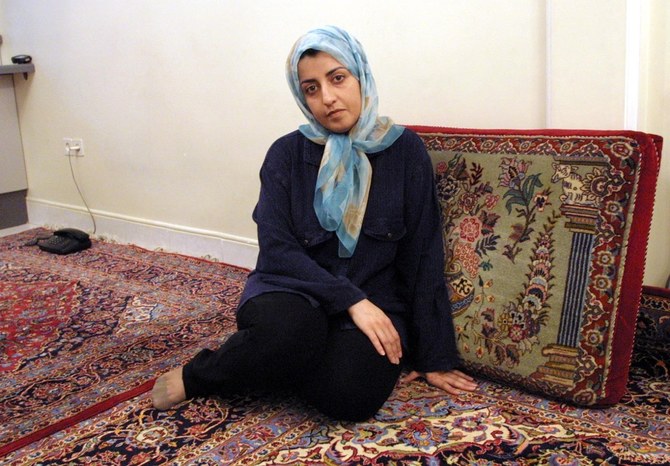
- Narges Mohammadi issues plea from Evin prison amid new crackdown by Tehran’s morality police
JEDDAH: Jailed Iranian Nobel laureate Narges Mohammadi urged Iranians on Monday to protest against the clerical regime’s “war against women” amid a new crackdown forcing women to cover their heads.
Mohammadi, who is being held in Evin prison in Tehran, called on Iranian women to share their stories of arrest and sexual assault at the hands of the authorities.
Iran launched a nationwide operation this month to enforce the wearing of the headscarf. Women have been arrested and taken to police stations by the morality police, and the Farsi hashtag meaning “war against women” has been trending on social media.
“People of Iran, I ask you, artists, intellectuals, workers, teachers, and students ... inside and outside the country to protest against this war against women,” Mohammadi said in a message from inside the prison. “Do not underestimate the power of sharing your experiences. Doing so will expose the misogynistic government and bring it to its knees.” She accused the authorities of bringing “a full-scale war against all women to every street in Iran.”
Mohammadi said she had been joined in jail by Dina Ghalibaf, a journalist and student who was arrested after accusing security forces on social media of putting her in handcuffs and sexually assaulting her during a previous arrest at a metro station. “For years, we have witnessed many women who have endured assault, abuse, and beatings by government agents,” Mohammadi said.
Mohammadi, 52, was awarded the Nobel Peace Prize last year in recognition of her campaign for human rights in Iran, which has led to her spending much of the past two decades in and out of jail. She has been imprisoned since November 2021 and has not seen her husband and twin children, who live in Paris, for several years.



